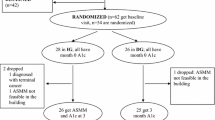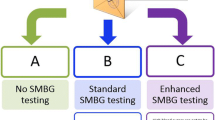Abstract
Non-adherence with self-monitoring blood glucose (SMBG) among teenagers with type 1 diabetes can be a problem. The purpose of this study was to investigate the feasibility, acceptability, and preliminary efficacy of using Internet-based incentives to improve adherence with SMBG in non-adherent teenagers. Participants were randomly assigned to contingent (CS; N = 23), where they had to meet web camera-verified SMBG goals to earn incentives, or non-contingent (NS) groups (N = 18), where they earned incentives independent of adherence. Brief motivational interviewing (MI) was given prior to the intervention. Attrition was 15 % in the CS group. Participants and parents endorsed the intervention on all intervention dimensions. Daily SMBG increased after one MI session, and further increased when incentives were added, but significantly more for so for older participants. SMBG declined slowly over time, but only returned to baseline levels for younger NS participants. Internet-based incentive interventions are feasible, acceptable, and show promise for improving adherence with SMBG.





Similar content being viewed by others
References
Anderson B, Ho J, Brackett J, et al. Parental involvement in diabetes management tasks: relationships to blood glucose monitoring adherence and metabolic control in young adolescents with insulin-dependent diabetes mellitus. J Pediatr. 1997; 130(2): 257-265.
Berg CA, Wiebe DJ, Suchy Y, et al. Individual differences and day-to-day fluctuations in perceived self-regulation associated with daily adherence in late adolescents with type 1 diabetes. J Pediatr Psychol. 2014; 39(9): 1038-1048.
Bryden KS, Dunger DB, Mayou RA, et al. Poor prognosis of young adults with type 1 diabetes: a longitudinal study. Diabetes Care. 2003; 26(4): 1052-1057.
Crowley R, Wolfe I, Lock K, et al. Improving the transition between paediatric and adult healthcare: a systematic review. Arch Dis Child. 2011; 96(6): 548-553.
Svoren BM, Volkening LK, Butler DA, et al. Temporal trends in the treatment of pediatric type 1 diabetes and impact on acute outcomes. J Pediatr. 2007; 150(3): 279-285.
The Diabetes Control and Complications Trial/Epidemiology of Diabetes Interventions and Complications (DCCT/EDIC) Study Research Group. Intensive diabetes treatment and cardiovascular disease in patients with type 1 diabetes. N Engl J Med. 2005; 353(25): 2643-2653.
Petry NM, Rash CJ, Byrne S, et al. Financial reinforcers for improving medication adherence: findings from a meta-analysis. Am J Med. 2012; 125(9): 888-896.
Higgins ST, Silverman K, Heil SH. Contingency Management in Substance Abuse Treatment. New York: Guilford Press; 2007.
Burkhart PV, Rayens MK, Oakley MG, et al. Testing an intervention to promote children’s adherence to asthma self‐management. J Nurs Scholarsh. 2007; 39(2): 133-140.
Rosen MI, Dieckhaus K, McMahon TJ, et al. Improved adherence with contingency management. AIDS Patient Care STDS. 2007; 21(1): 30-40.
Sorensen JL, Haug NA, Delucchi KL, et al. Voucher reinforcement improves medication adherence in HIV-positive methadone patients: a randomized trial. Drug Alcohol Depend. 2007; 88(1): 54-63.
Andrade LF, Barry D, Litt MD, et al. Maintaining high activity levels in sedentary adults with a reinforcement-thinning schedule. J Appl Behav Anal. 2014; 47(3): 523-536.
John LK, Loewenstein G, Troxel AB, et al. Financial incentives for extended weight loss: a randomized, controlled trial. J Gen Intern Med. 2011; 26: 621-626.
Raiff B, Dallery J. Internet-based contingency management to improve adherence with blood glucose testing recommendations for teens with type 1 diabetes. J Appl Behav Anal. 2010; 43: 487-491.
Stanger C, Ryan SR, Delhey LM, et al. A multicomponent motivational intervention to improve adherence among adolescents with poorly controlled type 1 diabetes: a pilot study. J Pediatr Psychol. 2013; 38(6): 629-637.
Wysocki T, Green L, Huxtable K. Blood glucose monitoring by diabetic adolescents: compliance and metabolic control. Health Psychol Off J Div Health Psychol Am Psychol Assoc. 1989; 8(3): 267-284.
Rohsenow DJ, Tidey JW, Martin RA, Colby SM, Sirota AD, Swift RM, et al. Contingent vouchers and motivational interviewing for cigarette smokers in residential substance abuse treatment. J Subst Abuse Treat [Internet]. 2015 [cited 2015 Jun 8]; Available from: http://www.sciencedirect.com/science/article/pii/S074054721500063X
Pew Research Center. The lives of teens and their technology [Internet]. 2008. Available from: http://www.pewinternet.org/2008/04/24/the-lives-of-teens-and-their-technology/
Silverman K, Svikis D, Wong C, et al. A reinforcement-based therapeutic workplace for the treatment of drug abuse: three-year abstinence outcomes. Exp Clin Psychopharmacol. 2002; 10(3): 228-240.
Clements MA, Foster NC, Maahs DM, Schatz DA, Olson BA, Tsalikian E, et al. Hemoglobin A1c (HbA1c) changes over time among adolescent and young adult participants in the T1D exchange clinic registry. Pediatr Diabetes. 2015.
Gerstl E-M, Rabl W, Rosenbauer J, et al. Metabolic control as reflectet by HbA1c in children, adolescents and young adults with type-1 diabetes mellitus: combined longitudinal analysis including 27,035 patients from 207 centers in Germany and Austria during the last decade. Eur J Pediatr. 2007; 167(4): 447-453.
Irvine A, Saunders J, Blank M, et al. Validation of scale measuring environmental barriers to diabetes-regimen adherence. Diabetes Care. 1990; 13(7): 705-711.
Higgins S, Wong C, Badger G, et al. Contingent reinforcement increases cocaine abstinence during outpatient treatment and 1 year follow-up. J Consult Clin Psychol. 2000; 68(1): 64-72.
Silverman K, Higgins ST, Brooner RK, et al. Sustained cocaine abstinence in methadone maintenance patients through voucher-based reinforcement therapy. Arch Gen Psychiatry. 1996; 53(5): 409-415.
Silverman K, Wong C, Umbricht-Schneiter A, et al. Broad beneficial effects of cocaine abstinence reinforcement among methadone patients. J Consult Clin Psychol. 1998; 66(5): 811-824.
Ferron JM, Farmer JL, Owens CM. Estimating individual treatment effects from multiple-baseline data: a Monte Carlo study of multilevel-modeling approaches. Behav Res Methods. 2010; 42(4): 930-943.
Ridenour TA, Pineo TZ, Molina MMM, et al. Toward rigorous idiographic research in prevention science: comparison between three analytic strategies for testing preventive intervention in very small samples. Prev Sci. 2013; 14(3): 267-278.
Kenward MG, Roger JH. Small sample inference for fixed effects from restricted maximum likelihood. Biometrics. 1997; 53(3): 983-997.
Karter AJ, Parker MM, Moffet HH, et al. Missed appointments and poor glycemic control: an opportunity to identify high-risk diabetic patients. Med Care. 2004; 42(2): 110-115.
Cafazzo JA, Casselman M, Hamming N, Katzman DK, Palmert MR. Design of an mHealth app for the self-management of adolescent type 1 diabetes: a pilot study. J Med Internet Res [Internet]. 2012 May 8 [cited 2015 Jun 1];14(3). Available from: http://www.ncbi.nlm.nih.gov/pmc/articles/PMC3799540/
Petry NM, Cengiz E, Wager J, et al. Testing for rewards: a pilot study to improve type 1 diabetes management in adolescents. Diabetes Care. 2015; 38(10): 1952-1954.
Author information
Authors and Affiliations
Corresponding author
Ethics declarations
Participants under 18 completed assent and parental/guardian consent. Parents who only spoke Spanish were given translated consent and assessment forms. Institutional review boards for both the research institute conducting the study and the hospital at which the study was conducted approved all procedures.
Additional information
Implications
Practice: Technology-delivered incentives can be used to increase adherence with blood glucose monitoring in teenagers with type 1 diabetes.
Policy: Policymakers who want to decrease the incidence of diabetes-related health complications should explore sustainable incentive-based interventions to increase adherence with medical regimens that could be implemented wide scale.
Research: Future research should be aimed at identifying procedures for delivering incentive-based interventions that can be sustained and maintained for long periods of time.
About this article
Cite this article
Raiff, B.R., Barrry, V.B., Ridenour, T.A. et al. Internet-based incentives increase blood glucose testing with a non-adherent, diverse sample of teens with type 1 diabetes mellitus: a randomized controlled Trial. Behav. Med. Pract. Policy Res. 6, 179–188 (2016). https://doi.org/10.1007/s13142-016-0397-5
Published:
Issue Date:
DOI: https://doi.org/10.1007/s13142-016-0397-5




